Student's Book â Dec 2009 (5.9mb) - The Curriculum Project
Student's Book â Dec 2009 (5.9mb) - The Curriculum Project
Student's Book â Dec 2009 (5.9mb) - The Curriculum Project
Create successful ePaper yourself
Turn your PDF publications into a flip-book with our unique Google optimized e-Paper software.
KEY WORDSconfrontation (n) – a hostile face to face disagreementconsensus (n) – general agreementintervene (v) – to enter into a situation to change its course or resolve itinterference (n) – unwanted involvement in the affairs of othersveto (v) – to use authority to prevent a policy being made.vulnerability (n) – a feeling of weakness or of being open to attackASEAN: ChallengesMany ASEAN members gained independence fairly recently and began the process of nationbuilding. Since many ASEAN members are also quite small in size, this can lead to a sense ofvulnerability among members.When countries join together to achieve common objectives, they often have to compromisein order to come to an agreement. Compromise means sometimes giving up what you want orsome power that you have. Smaller countries may be fearful of the larger countries, and may notwant to give up power to them.In order to work together, therefore, ASEAN members have agreed to principles ofnon-interference, consensus, non-use of force, and non-confrontation. <strong>The</strong> principle of consensusmeans that every member of the organisation has the right to veto a decision. Everymember must agree before any decision is made. Non-interference means that no country willget involved with another country’s problems unless they are asked to help by that country.Critics of ASEAN say that consensus among so many independent nations is too difficult tomaintain and will interfere with the group’s ability to make decisions. <strong>The</strong>y say that consensusweakens ASEAN and its image. <strong>The</strong> principle of non-interference has make ASEAN incapableof dealing with problems in Burma, haze pollution in Indonesia and Malaysia and human rightsabuses across the region. In these situations, many people say ASEAN should intervene.exercisecomprehensionA. Why is it difficult for different nations to work together?B. Describe in your own words how ASEAN members make decisions.C. What are two advantages of non-interference, consensus and non-confrontation?What are two disadvantages?exercisedefiningextensionapplying andreformattinginformationUsing the text, what is another way to say the following:a) compromiseb) consensusc) non-interferenceDefine these terms in your own words.Look at the cartoon to the right andanswer the following questions:a) What is happening inside the walls?b) What is happening outside thewalls?c) If you were in this scene and youbelieved in non-interference, whatwould you do?d) Why do you think the countries ofASEAN agreed to the principle ofnon-interference?59



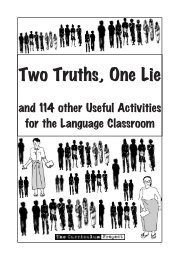
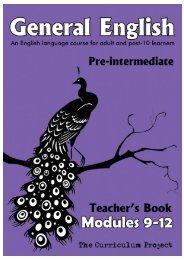

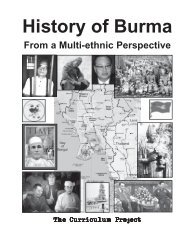

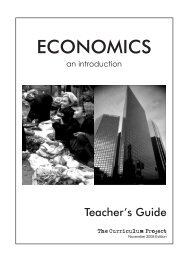



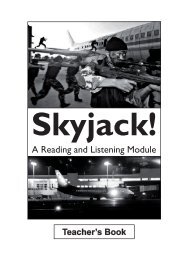
![[Eng] Nov 2012 DRAFT - The Curriculum Project](https://img.yumpu.com/45590859/1/184x260/eng-nov-2012-draft-the-curriculum-project.jpg?quality=85)


